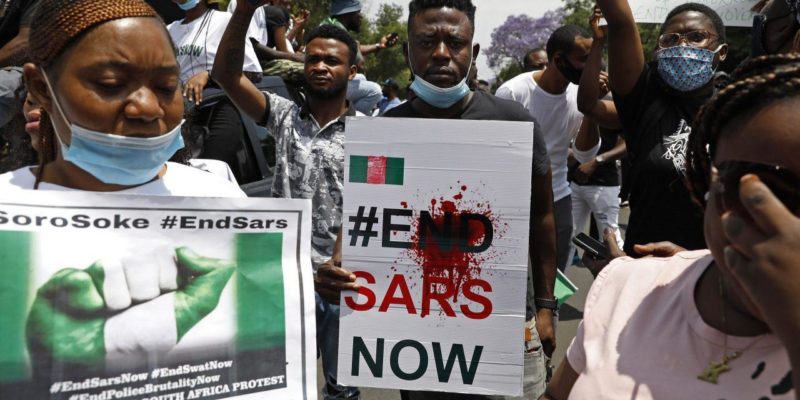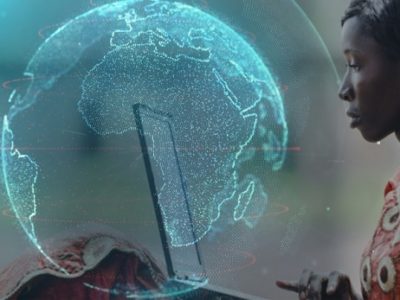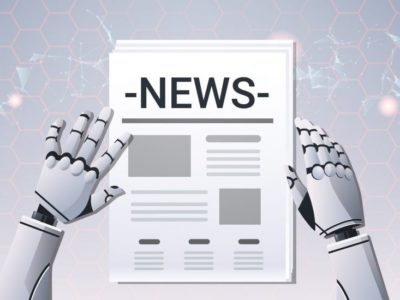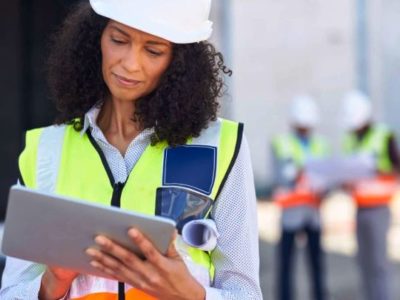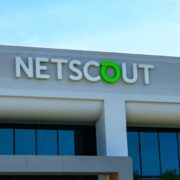#ENDSARS would be Nigeria’s first taste of how technology is conniving with globalisation and other factors to shape a new identity for Nigeria’s young urban dwellers – Olusegun Oruame.
Like many other developing nations, Nigeria is experiencing a significant shift in demographics and cultural dynamics due to rapid urbanization. The influx of people into cities has brought about a complex interplay of factors that influence the construction and evolution of identity within these urban landscapes.
RELATED: #EndSARS: Northern governors want social media regulated
According to several authorities, urbanisation or urban trends cannot be overlooked in Nigeria. With an annual urban population growth of 4.3 per cent and the country hosting five of the 30 largest urban settlements on the African continent, urbanisation will play an even more pivotal role by 2037 because at its current growth rate, Nigeria’s urban population will double in the next two decades.
“Far from being poor or struggling youths, those that formed the leadership of the #ENDSARS were young, urbane, rich with extensive global influence. A generation that does not depend on government’s handouts and has built extensive wealth with global influence by leveraging emerging technologies that defy governments and largely anti-establishment,”
Why not? The “dynamic interplay between individuals and their environment, reciprocally shapes each other within the context of unique and defining characteristics of an urban locale. That is the increasing Nigerian experience of urbanity that could shape its future politics or economy based on the not-so fixed “natural and artificial elements of a city, its social, cultural and historical characteristics” whether in Jos, Plateau State where the Baobab Africa – The Conversations recently held.
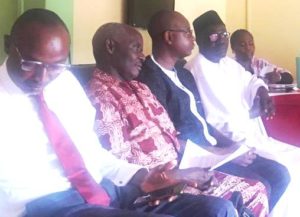
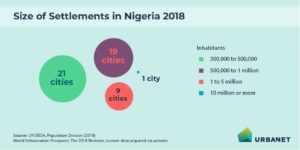
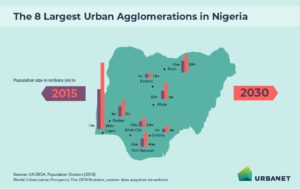
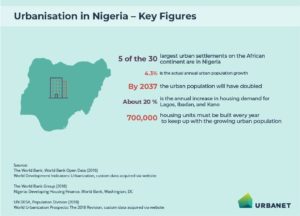
Source for infographics: Urbanet
Gathering under the auspices of the Baobab Media, the select group of intellectuals look into the multifaceted relationship between urbanization and identity formation in contemporary Nigerian society. Their conversations were revealing. Urban trends could hold the ace to finally building Nigeria as a nation and urbanisation could mean the emergence of the first true Nigerian political leaders with an identity not anchored on allegiance to any ethnic groups or religious interests.
How has the shifting ethos of identities evolved from time past to the now to define the Nigerian or the Nigerian society? Seasoned Professor with the Department of History and International Studies in the University of Jos, Prof Sati Fwatshak opened with a historical perspective to ignite the conversation that Sunday afternoon in Jos.
His words: “Colonialism created new forms of identity in urban spaces, before then, what we had can accurately be described as forms of “village Identity”. Identity shapes the lives of many people. When people migrate, which is usually driven by economic and livelihood issues, the first point of call is those that share cultural affinities with them. Colonialism gave a new face to urban identities. People wanted “a home away from home”. The introduction of foreign religions (Islam and Christianity) created other forms of identity. Multiple identities are springing up in the urban spaces. Therefore, people now have multiple identities.”
Fwatshak believes colonialism gave a new identity to urban identity; multiple identities are now springing up in the urban spaces determined by various factors. Dr Peter Sesan Abraham, lecturer and researcher working in the Peace and Conflict Studies Department, University of Jos, shared Fwatshak’s perspective.
“Identity is as old as Nigeria. Identity has continued to metamorphose and is still evolving. This is seen in women identity groups such as the “Zumuntan mata” associations. In commerce and trade, we see the Michika boys everywhere. Politics has drawn and attracted people to the city centres. Settlement patterns are also associated with identity. Those in enriched environments and those in impoverished environment; the rich and poor, carry different identities. Education has also demarcated the city to different groups. Consequently, identity is a part of us and has continued to evolve and change,” said Abraham, who has worked extensively on issues connected to the impact of identity on social cohesion in contemporary Nigeria.
Dr Joseph Anuga, Senior Academic staff with the Department of Political Science in the University of Jos, expressed similar position. He said “clan identity was the defining factor and not ethnic identity from the beginning. identity can have a single point/root but mediated by several other activities, in this case, urbanization. The urban environment, particularly the process of industrialization, forces social relations to change.”
#EndSARS – technology and globalisation in identity formation
In a way, the dons offered the context to look at the emergence of contemporary urban phenomenon such as the #End SARS as a new social movement with a primacy that has birthed a new identity or identity-based movement.
The #ENDSARS is largely deemed to be ‘citizen agitations’ that evolved into social movements, primarily against the Special Anti-Robbery Squad (SARS) by young people in urban centres and ballooned to become agitations against perceived social and economic injustices in urban centres beginning with Lagos, Nigeria’s commercial capital of over 15 million people.
#ENDSARS would, perhaps, be Nigeria’s first taste of how technology and globalisation with other factors are shaping a new identity among Nigeria’s young urban dwellers. The #ENDSARS completely rattled the authorities
For Associate Professor and Head of Department of Linguistics and Nigerian Languages, University of Jos, Dr Lengji Danjuma, who offered insights on the relationship between urbanization and identity from a linguistic perspective, “the emerging urban identity can be seen in the aspect of identity such as “naija”, “pidgin English” or “Nigerian English”, that is uniquely Nigerian English. Many expressions are encapsulated in these emerging identities. Even food such as “Amala”, “Semo and Egusi”, “Nigerian Jollof”. Dressing/clothing which are at variance with our traditional attires. There is an emerging identity which is “Nigerian”, different from the primitive identities [of pre-colonial and colonial times].”
Within the #ENDSARS context, Danjuma’s perspective rings home some hardnosed facts on language, identity and urbanisation. #ENDSARS was not just about the use of social media as a platform but the language, style, tone used in mobilisation by young people could be said to be uniquely their own online pidgin lexis that have now become most of everyday pidgin lexicons on the streets of Lagos, Jos and other urban centres. Terms like ‘soro soke’ are now part of daily expressions to mean ‘Speak ou’t or ‘raise your voice’. To fully grasp these words, you necessarily must be young, a tech-native and belong to the Gen Z. You must belong to the ‘soro soke’ or ‘tech bro’ generation.
The discussants including some members of the larger audience, agreed that the pace of urbanization in Nigeria has been remarkable, with cities expanding exponentially. Lagos, Abuja, Kano, Port Harcourt, Kaduna, Jos and Minna among others stand as symbols of this rapid transformation. Whether in Jos, Lagos, Kaduna or even Benin City, urban centres have become melting pots of cultures, languages, traditions and technology adoption, where diverse groups interact, creating a unique tapestry of identities.
No Easy Walkway to creating a Nigerian Identity
There is also the inherent reality of shifting identity landscapes as in these urban environments, traditional identities often intermingle with modern aspirations, leading to the emergence of hybrid identities. Individuals and communities navigate multiple identities, embracing aspects of their ethnic, religious, and cultural heritage while embracing globalized influences. This hybridization is evident in fashion, language, music, and lifestyle choices, signifying a dynamic evolution of Nigerian identity, Anuga noted.
According to Prof Fwatshak, “the urban space creates new and ever changing multiple identities,” adding that: “there are two concepts that are central to understanding the concept of identity. There is the concept of ‘Situational Identity.’ Why do identities continue to shift? Identity and its meanings continue to shift as situations and circumstances change in time and space. There is the concept of ‘social capital’. Identity is a network to tap into.”
Fwatshak with the other discussants appeared to suggest that there is no easy walkway to creating a Nigerian identity. While government policies could advance or diminish a Nigerian identity, a national identity too often reflects interplay of several forces particularly within urban centres where for example, the establishment of a publicly owned commercial enterprise could instigate the formation of an identity you see as peculiarly Nigerian not Berom or Nupe or Hausa or Yoruba or Ibo.
According to Prof. Fwatshak, who is widely published in both local and international for a, “Economic production can help create a Nigerian identity. When you create something that can penetrate the global market, it can become a Nigerian identity. To break into the global phenomenon of identity, there must be productivity. For example, Innoson Motors can be made a global Nigerian product. This is what car brands such as Toyota, Honda, Mercedes Benz and other global car brands have been able to achieve. Creativity, innovation can help nations to create a global identity. Capitalism is the identity of the western world.”
Leveraging Nigeria’s urbanization phenomenon
How can Nigeria leverage its urbanization phenomenon in the face of the challenges and opportunities?
Agreeably, urbanization also presents challenges to identity construction. Rapid urban growth can lead to social fragmentation and loss of community ties, triggering identity crises for some individuals. Additionally, disparities in access to resources and opportunities in cities can deepen divides and impact how identities are perceived and constructed.
Certainly, this has been the case in Jos city where urban violent upheavals in 2001 involving Christians and Muslims with strong ethnic colourations and thereafter, series of similar violent eruptions in over two decades, have redefined Jos, the entire central Nigeria and all of Nigeria by extension.
What then is the identity of Jos or Kaduna and other urban centres wracked by violence in the last few years? Fwatshak offered a response: “These violent conflicts have created divisions along many fault lines; religious, ethnic, segregated communities [so that even] monolithic religious affiliations [operate within] multiethnic identities.”
Nevertheless, urban spaces offer tremendous opportunities for inclusivity and cultural exchange. When consciously and properly managed, urban spaces serve as platforms for dialogue and understanding between different ethnic, religious, and cultural groups, fostering a sense of unity in diversity.
“The social media fostered #ENDSARS movement has instigated a new direction for Nigeria’s urban identity that will invariably determine the future of its politics, social cohesion and economy.”
While there are difficulties in managing the tapestry of emerging and varying, Nigerian identities in cities like Lagos and Abuja, there are conscious attempts to build or even project a Nigerian identity that can be pointed easily as Nigerian within a global space.
Abraham and Danjuma think there is a gradual but tenuous shift towards cross cultural acceptance helping to broaden the idea of urban identity notably in areas that have recorded violent conflicts like Jos, Plateau State.
“Cultural festivities such as “Pusduung”, “Nzem Berom” are platforms that are now celebrated by other people from other ethnic groups. These are other dimensions of urban life that unite people,” said Abraham.
Danjuma, a language expert whose academic interest includes the linguistic foundations of cultural systems, is in agreement with Abraham. He is convinced that “cultural associations are a reflection of urbanization,” and they are increasingly becoming that point of engagement to identity with other manufactured identities whether social, ethnic, economic or political. This is where the Nigerian pidgin language as a form of national identity becomes a binding one irrespective of the multiplicity of other identities.
Technology, Nigerian identity and globalization
Interestingly, this is where technology and the sifting dynamics of jobs and entrepreneurship becomes handy to creating a more authentic, contemporary Nigerian identity with a global focus. The new significance of the #ENDSARS suffices here. Far from being poor or struggling youths, those that formed the leadership of the #ENDSARS movement were young, urbane, rich with extensive global influence. A generation that does not depend on government’s handouts and has built extensive wealth with global influence by leveraging emerging technologies such as Blockchain and Artificial Intelligence (AI) that defy governments and largely anti-establishment, the authorities were left panting in search of answers to adequately address the innovative phenomenon called #ENDSARS.
For the discussants, the social media fostered #ENDSARS movement has instigated a new direction for Nigeria’s urban identity that will invariably determine the future of its politics, social cohesion and economy.
As was the case in western societies where education, skill acquisition and industrialisation helped to shape identities and create “standardization whether in dressing or clothing as in the fashion industry, or in road construction, housing and real estate development, manufacturing, etc., industrialization [in Nigeria] can provide opportunities for standardization of consumption patterns” [and invariably, create a national identity driven by technology and other global influences, said Anuga, who has extensively researched the relationship between identity and political contestation in contemporary Nigeria.
Anuga’s position appears to support the contribution by a member of the audience, Mr. Godwin Urhie, founder of Oakland Polytechnic.
Urhie had canvassed for a need to emphasize the multidimensionality of identity whether professional identity, entrepreneurship identity, civil service identity and how these multiple identities can be integrated into a Nigerian identity.
Accordingly, the contributors shared the common suasion that to forge a national identity, policy makers and other stakeholders must begin to see identity as productivity-centred rather than culturally-centred meaning that local government areas for example, could focused on a “one-product” industrialisation policy, which not only has the potential to stem the tide of rural-urban migration but also create an identity that is Nigerian in the productive sense.
Without doubt, technological advancements and globalization play a pivotal role in shaping urban identities. Today, social media and digital connectivity serve as catalysts for the dissemination of ideas, enabling individuals to express and construct their identities in new ways. The youth, especially, are at the forefront of this transformation, embracing global trends while redefining what it means to be Nigerian in the digital age.
An emerging Nigerian Identity
For all the speakers at the Baobab Africa – The Conversation, urbanization in Nigeria is not merely a demographic shift but a catalyst for a complex reconfiguration of identities. It intertwines tradition with modernity, challenges old constructs, and creates new ones. The evolving urban landscape presents both challenges and opportunities in constructing a contemporary Nigerian identity that celebrates diversity while embracing unity.
In navigating this landscape, Nigeria stands at the precipice of defining itself in a globalized world, where identities are fluid, dynamic, and inclusive. It behoves on policy makers to harness the positive aspects of urbanization on identity construction. They must focus on creating inclusive urban spaces. Initiatives that promote cultural exchange, education, and equitable access to resources can foster a sense of belonging and pride in diverse identities. The #ENDSARS movement teaches that to” intentionally not take action” is to walk into waiting dangers.
The Baobab Africa – The Conversation by Baobab Media is a platform for “deep insights sharing” through conversations at national and global scales.
Olusegun Oruame is founder and Executive Editor, Baobab Media. First published in Baobab Africa People & Economy with the title: ‘Experts on navigating urbanization and identity construction in contemporary Nigeria’


